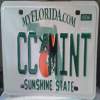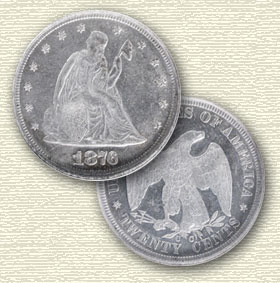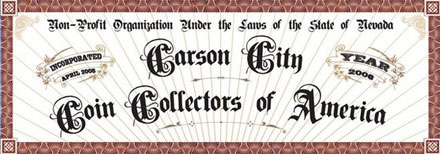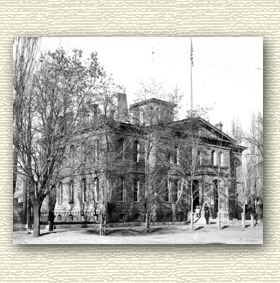- Posts: 91
- Thank you received: 0
Warning: Undefined variable $end_tag_params in /home/c4oa/public_html/libraries/kunena/External/Nbbc/src/BBCode.php on line 2321
Warning: Undefined variable $end_tag_params in /home/c4oa/public_html/libraries/kunena/External/Nbbc/src/BBCode.php on line 2321
1873-CC $10 Carson City Coin of the Week June 26, 2011
- deepsouthspike
-

- Offline
- Senior Member
-

Less
More
14 years 5 months ago #2808
by deepsouthspike
Warning: Undefined variable $end_tag_params in /home/c4oa/public_html/libraries/kunena/External/Nbbc/src/BBCode.php on line 2321
Replied by deepsouthspike on topic Re:1873-CC $10 Carson City Coin of the Week June 26, 2011
Warning: Undefined variable $end_tag_params in /home/c4oa/public_html/libraries/kunena/External/Nbbc/src/BBCode.php on line 2321
Replied by deepsouthspike on topic Re:1873-CC $10 Carson City Coin of the Week June 26, 2011
Belay,
I wonder if your 73-CC Eagle From the Rian's Bequest Collection is the coin Greeley offered to "Hank Monk" to pick up the pace? You never know.....
What a great rarity in the long list of famous and desirable "CC" magic dates!
quite an enjoyable story!
Best
deepsouth.....
I wonder if your 73-CC Eagle From the Rian's Bequest Collection is the coin Greeley offered to "Hank Monk" to pick up the pace? You never know.....
What a great rarity in the long list of famous and desirable "CC" magic dates!
quite an enjoyable story!
Best
deepsouth.....
Please Log in to join the conversation.
14 years 5 months ago #2815
by Belayoff
Warning: Undefined variable $end_tag_params in /home/c4oa/public_html/libraries/kunena/External/Nbbc/src/BBCode.php on line 2321
Replied by Belayoff on topic Re:1873-CC $10 Carson City Coin of the Week June 26, 2011
C4OA Lifer!
Warning: Undefined variable $end_tag_params in /home/c4oa/public_html/libraries/kunena/External/Nbbc/src/BBCode.php on line 2321
Replied by Belayoff on topic Re:1873-CC $10 Carson City Coin of the Week June 26, 2011
If coins could only tell their own story.
Belay Off
Belay Off
C4OA Lifer!
Please Log in to join the conversation.
14 years 5 months ago - 14 years 5 months ago #2819
by randysc
Warning: Undefined variable $end_tag_params in /home/c4oa/public_html/libraries/kunena/External/Nbbc/src/BBCode.php on line 2321
Replied by randysc on topic Re:1873-CC $10 Carson City Coin of the Week June 26, 2011
Warning: Undefined variable $end_tag_params in /home/c4oa/public_html/libraries/kunena/External/Nbbc/src/BBCode.php on line 2321
Replied by randysc on topic Re:1873-CC $10 Carson City Coin of the Week June 26, 2011
A great fact filled article once again, from a major hub of this club.
An interesting point you make about the questionable existence of an AU-58 example of the 1873-CC eagle. Carsonite did shine more light as to this dilemma, but still no conformation.
As to having poor quality C.C. gold coins in your earlier state of coin collecting, I would think that as a collector, the level of his (or hers) collecting budget that allowed them the quality of coin they could afford would get the same appreciation for that coin as Harry Bass had for his. Is there such thing as having a bad C.C. coin?
-R-
An interesting point you make about the questionable existence of an AU-58 example of the 1873-CC eagle. Carsonite did shine more light as to this dilemma, but still no conformation.
As to having poor quality C.C. gold coins in your earlier state of coin collecting, I would think that as a collector, the level of his (or hers) collecting budget that allowed them the quality of coin they could afford would get the same appreciation for that coin as Harry Bass had for his. Is there such thing as having a bad C.C. coin?
-R-
Last edit: 14 years 5 months ago by randysc.
Please Log in to join the conversation.
- coindrummer
-

- Offline
- Platinum Member
-

- Michael D. Parrott
Less
More
- Posts: 775
- Thank you received: 0
14 years 5 months ago #2822
by coindrummer
Warning: Undefined variable $end_tag_params in /home/c4oa/public_html/libraries/kunena/External/Nbbc/src/BBCode.php on line 2321
Replied by coindrummer on topic Re:1873-CC $10 Carson City Coin of the Week June 26, 2011
C4OA Lifer!
Warning: Undefined variable $end_tag_params in /home/c4oa/public_html/libraries/kunena/External/Nbbc/src/BBCode.php on line 2321
Replied by coindrummer on topic Re:1873-CC $10 Carson City Coin of the Week June 26, 2011
Hi Belay
"If coins could tell their own story"....
I have had that thought many many times.
There is a movie made several years back starring Samuel Jackson called "The Red Violin"...a story about a specialty instrument made by an Italian master violin maker and the adventures and rich life the violin led. The very same story could be made for a Carson City coin...a well used one at that...imagine the tales it could tell!
The makings of a motion picture!
the drummer
"If coins could tell their own story"....
I have had that thought many many times.
There is a movie made several years back starring Samuel Jackson called "The Red Violin"...a story about a specialty instrument made by an Italian master violin maker and the adventures and rich life the violin led. The very same story could be made for a Carson City coin...a well used one at that...imagine the tales it could tell!
The makings of a motion picture!
the drummer
C4OA Lifer!
Please Log in to join the conversation.
14 years 5 months ago - 14 years 5 months ago #2824
by randysc
Warning: Undefined variable $end_tag_params in /home/c4oa/public_html/libraries/kunena/External/Nbbc/src/BBCode.php on line 2321
Replied by randysc on topic Re:1873-CC $10 Carson City Coin of the Week June 26, 2011
Warning: Undefined variable $end_tag_params in /home/c4oa/public_html/libraries/kunena/External/Nbbc/src/BBCode.php on line 2321
Replied by randysc on topic Re:1873-CC $10 Carson City Coin of the Week June 26, 2011
Well if the 1873-C.C. eagle could tell its story, it would have to admit it was not on that stage with Monk and Greeley as that ride took place, I believe, around 1859.
-R-
-R-
Last edit: 14 years 5 months ago by randysc.
Please Log in to join the conversation.
14 years 5 months ago - 14 years 5 months ago #2825
by Carsonite
Warning: Undefined variable $end_tag_params in /home/c4oa/public_html/libraries/kunena/External/Nbbc/src/BBCode.php on line 2321
Replied by Carsonite on topic Re:1873-CC $10 Carson City Coin of the Week June 26, 2011
C4OA Lifer!
Warning: Undefined variable $end_tag_params in /home/c4oa/public_html/libraries/kunena/External/Nbbc/src/BBCode.php on line 2321
Replied by Carsonite on topic Re:1873-CC $10 Carson City Coin of the Week June 26, 2011
RandyC, You got it right with 1859.
In 1859, Horace Greeley, the forty-eight-year-old former New York congressman, outspoken abolitionist, and women’s rights advocate, was touring the West he had been touting to the nation. On July 30, he found himself at an inn south of Genoa, NV running late for a lecture on the western slope of the Sierra Nevada. Turning to the stagecoach driver, Greeley asked the 33-year-old Hank Monk if it was possible to cross the massive mountain range in time to make his presentation in Placerville, California that evening. Monk assured the worried Greeley that he would get him there on time.
Leaving around dawn, the stagecoach followed the Carson River to Hope Valley, then turned north over Luther Pass to Lake Valley. From there, the stage climbed Meyers Grade to the top of Johnson Pass and shortly after noon pulled into Strawberry to change horses.
According to Monk’s version of the story, Greeley, in some distress, asked the driver if he was certain that he could get him to Placerville by 5 p.m. Knowing Strawberry was the last telegraph station before his final destination, Greeley wanted to send a telegram notifying the reception committee if he was going to be late. Monk emphatically responded, “I’ll get you there.”
Greeley experienced the ride of his life. He later wrote, “Yet at this breakneck rate we were driven for not less than four hours or forty miles changing horses every ten or fifteen, and raising a cloud of dust through which it was difficult at times to see anything.”
Hank Monk told a writer for San Francisco's Golden Era the following year,“Just before I got to Dick’s [Station] I looked into the coach and there was Greeley, his bare head bobbing, sometimes on the back and then on the front of the seat, sometimes in the coach and then out, and then on the top and then on the bottom, holding on to whatever he could grab.”
At one point, according to Monk, Greeley cried out, “Driver, I’m not particular for an hour or two!” Monk responded, “Horace keep your seat! I told you I would get there by five o’clock, and by God I’ll do it, if the axles hold!”
The shaken and disheveled Greeley arrived in time to meet the reception committee some twelve miles east of Placerville. Monk traveled on to the town, arriving there before Greeley. When the two men met up again upon Greeley’s arrival, the Eastern greenhorn bought the daredevil stagecoach driver the finest suit of clothes available in Placerville as a token of his appreciation.
Greeley wrote his version of the harrowing ride on August 1, 1859. It was published in the New York Tribune after his account reached New York City by mail.
Hank Monk, with the Tribune story and other accounts making him a national figure, regaled all who would listen to his role in the now famous ride.
Mark Twain heard the story from Monk while he was living in Nevada Territory in the early 1860s, comically recounted it in his 1866 western lecture tour, and embellished the tale in Roughing It (1872).
Credit to former Nevada State archivist, Guy Rocha, for some of the above information.
If we keep up this Hank Monk theme, I might need to create a new category on this discussion board---Hank Monk Stories.
P.S. - I wrote about Ulysses S. Grant's trip to Carson City and Virginia City in 1879, in my book about James Crawford. I tell how Hank Monk drove Grant's stagecoach over the Carson spur of the Sierra Nevada into Carson City. I also talk about Carson City musician and composer J. P. Meder writing his Hank Monk Schottische. (It has a lively beat.)
Rusty
In 1859, Horace Greeley, the forty-eight-year-old former New York congressman, outspoken abolitionist, and women’s rights advocate, was touring the West he had been touting to the nation. On July 30, he found himself at an inn south of Genoa, NV running late for a lecture on the western slope of the Sierra Nevada. Turning to the stagecoach driver, Greeley asked the 33-year-old Hank Monk if it was possible to cross the massive mountain range in time to make his presentation in Placerville, California that evening. Monk assured the worried Greeley that he would get him there on time.
Leaving around dawn, the stagecoach followed the Carson River to Hope Valley, then turned north over Luther Pass to Lake Valley. From there, the stage climbed Meyers Grade to the top of Johnson Pass and shortly after noon pulled into Strawberry to change horses.
According to Monk’s version of the story, Greeley, in some distress, asked the driver if he was certain that he could get him to Placerville by 5 p.m. Knowing Strawberry was the last telegraph station before his final destination, Greeley wanted to send a telegram notifying the reception committee if he was going to be late. Monk emphatically responded, “I’ll get you there.”
Greeley experienced the ride of his life. He later wrote, “Yet at this breakneck rate we were driven for not less than four hours or forty miles changing horses every ten or fifteen, and raising a cloud of dust through which it was difficult at times to see anything.”
Hank Monk told a writer for San Francisco's Golden Era the following year,“Just before I got to Dick’s [Station] I looked into the coach and there was Greeley, his bare head bobbing, sometimes on the back and then on the front of the seat, sometimes in the coach and then out, and then on the top and then on the bottom, holding on to whatever he could grab.”
At one point, according to Monk, Greeley cried out, “Driver, I’m not particular for an hour or two!” Monk responded, “Horace keep your seat! I told you I would get there by five o’clock, and by God I’ll do it, if the axles hold!”
The shaken and disheveled Greeley arrived in time to meet the reception committee some twelve miles east of Placerville. Monk traveled on to the town, arriving there before Greeley. When the two men met up again upon Greeley’s arrival, the Eastern greenhorn bought the daredevil stagecoach driver the finest suit of clothes available in Placerville as a token of his appreciation.
Greeley wrote his version of the harrowing ride on August 1, 1859. It was published in the New York Tribune after his account reached New York City by mail.
Hank Monk, with the Tribune story and other accounts making him a national figure, regaled all who would listen to his role in the now famous ride.
Mark Twain heard the story from Monk while he was living in Nevada Territory in the early 1860s, comically recounted it in his 1866 western lecture tour, and embellished the tale in Roughing It (1872).
Credit to former Nevada State archivist, Guy Rocha, for some of the above information.
If we keep up this Hank Monk theme, I might need to create a new category on this discussion board---Hank Monk Stories.
P.S. - I wrote about Ulysses S. Grant's trip to Carson City and Virginia City in 1879, in my book about James Crawford. I tell how Hank Monk drove Grant's stagecoach over the Carson spur of the Sierra Nevada into Carson City. I also talk about Carson City musician and composer J. P. Meder writing his Hank Monk Schottische. (It has a lively beat.)
Rusty
C4OA Lifer!
Last edit: 14 years 5 months ago by Carsonite. Reason: Credit
Please Log in to join the conversation.
Time to create page: 0.170 seconds


